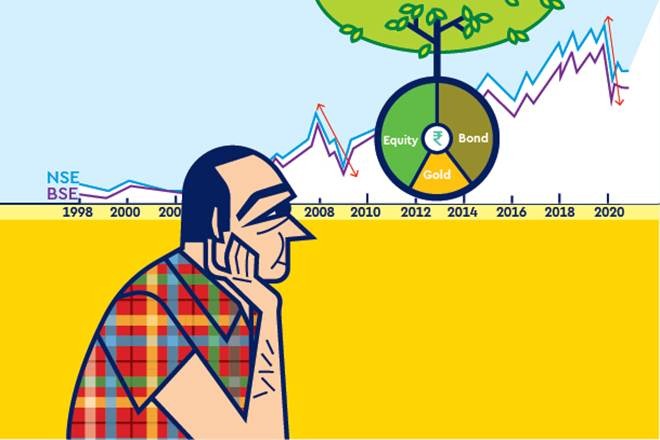Over the long haul, if you do a judicious allocation to equity, debt, or any other asset like gold, you would get decent returns.
In uncertain times like these, when the equity market is going through a significant correction and there are certain issues in debt funds, it is a good time to look back and reflect on the returns from these two asset classes over the long term.
NSE data
NSE 10-year Benchmark G-Sec index, from April 3, 1998 till April 30, 2020, has given compound annualised return of 8.86%. Over the same period, Nifty 50 index grew from 1173 to 9860, giving compounded annualised return of 10.1%. Since this is on price terms, let us add back dividends, and we come to 11.5%. That is, over a period of 22 years, the outperformance of equity over debt is about 2.5%.
BSE data
Over the last 10 years, till May 7, 2020, BSE Government Bond Index has yielded 9.03% annualised whereas BSE
Sensex Total Return index has yielded 8.03% in the same period. That means, over the last 10 years, bond has outperformed equity by 1%. Though over long periods of time equity has outperformed bonds, in certain phases after equity market correction it is the opposite. In other words, it is not a given that equity will outperform bond over all reasonably long periods.
Nature of returns
There is a fundamental difference in the nature of returns from equity and bond. In equity it is mostly from price appreciation, dividend yield being much on the lower side, say 1.5% per year. In bonds, the earnings are mostly from accrual, i.e., coupon. Price appreciation in bonds is on the lower side. That means, earnings from bonds are more stable because coupons are committed. In equity, it is about discovery of the company and its earnings potential. Market’s discounting of the multiple variable factors goes up and down at various points of time. This leads to higher volatility in returns from equity. When the volatility is positive, e.g., the price-earnings multiple is higher than usual, return from equity outperforms bonds handsomely.
Learning
Equity and bond are expected to behave differently for most of the economic variables, for example, GDP growth rate, inflation, etc. Though it is not a perfectly negative correlation, many a time, we see inverse movements in the two asset classes. To benefit from this, and to reduce volatility in your portfolio, it is advisable to have both in your portfolio. The ratio between the two would depend upon your horizon and appetite for volatility, as equity is more volatile. Though portfolio allocation / diversification is an old and established theory, the current market conditions prove the point once again.
Conclusion
The future is by definition uncertain. Equity is expected to give a higher return over bonds over the long term, reflecting the nominal growth rate of GDP, but we have seen the data above. Hence even for the long horizon, it is advisable to have a judicious allocation between the two asset categories. Another perspective is that bonds have the risk of default, which is not there in equities. This risk can be minimised by getting into government securities or top rated corporate bonds.
Net-net, over the long haul, if you make a judicious allocation to equity, debt, or any other asset like gold, you would get decent returns without subjecting it to as much volatility.
Source: https://www.financialexpress.com/money/bonds-or-equity-which-one-gives-higher-returns-over-the-long-term/1959319/


